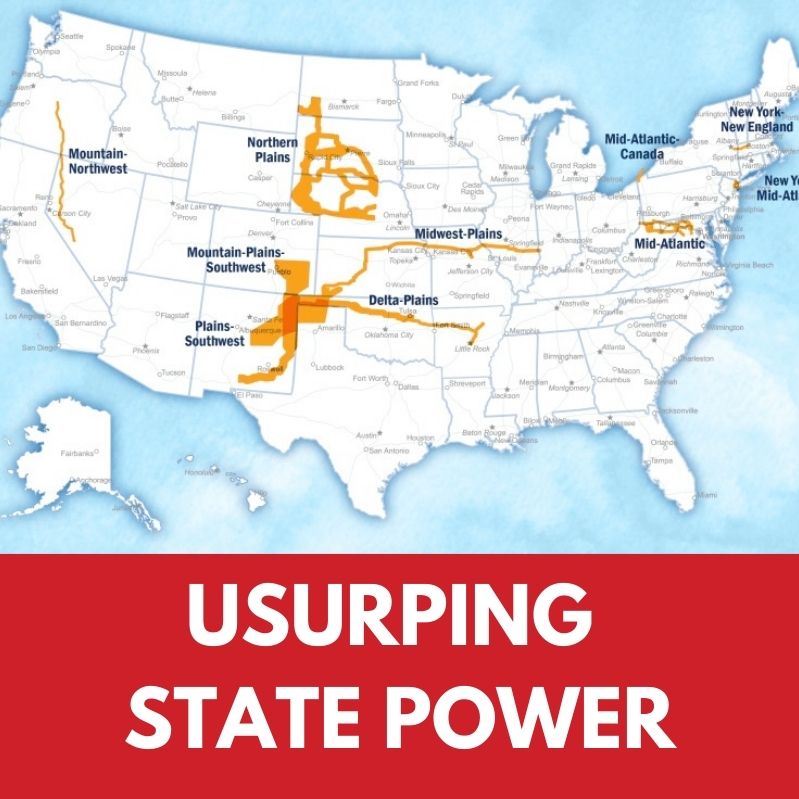The Department of Energy has released an alarming preliminary list of Electric Transmission Corridors that are massive in length and width, potentially encumbering millions of acres of private property. However, the same law that authorizes the corridors also provides states and local governments the path to stop this federal overreach using the unique “coordination” authority.
Congress authorized the Energy Department to identify areas where there are electric transmission capacity constraints and congestion through the Federal Powers Act (FPA). The intent was to help identify and expedite transmission needs in vulnerable areas. These areas were to be designated as National Interest Electric Transmission Corridors (NIETC).
The law specifically directs the federal agency to conduct the Needs Study and potential transmission project in coordination with state and local authorities. Neither the Needs Study, nor the “Preliminary List of Potential NIETCs” were prepared with local input. Most elected leaders were not even aware of the federal plan until the preliminary corridor map was circulated by alarmed citizens.
Most concerning is that the law gives the federal agency the authority to usurp the state’s authority and approve transmission projects within designated NIETCs even if the state has denied the project application.
Section 824p authorizes the federal agency to issue a permit for a transmission project if “a State commission or other entity that has authority to approve the siting of the facilities … has denied an application seeking approval pursuant to applicable law.” (16 USC 824p(b))
It is a critical infringement of state’s rights compounded by the Biden-Harris Administration’s failure to establish the preliminary corridors without first coordinating with the states and local governments. A group of State Farm Bureaus filed substantial comments revealing many of the flaws in the process, violations of law, and significant impacts the plan will impose on local communities.
Upon release of the preliminary corridors, the Energy Department explained the designations were necessary to increase transmission of green intermittent energy, which often requires separate transmission lines and facilities.
“The challenges facing the Nation’s energy system have substantially shifted in the last one hundred years and will continue to evolve. Yet, today’s grid cannot adequately support 21st century challenges —including the integration of new clean energy sources and growing transportation and building electrification — while remaining resilient in the face of extreme weather exacerbated by climate change. The power grid is the backbone of the nation’s electricity system, and it must adapt to maintain reliability and resiliency.”
The Energy Department has completed the first two phases of the assessment. The first phase was finished with the release of the Needs Study, and the second with the release of the preliminary corridors. They are now beginning phase three where they will initiate the scoping process and environmental analysis required under the National Environmental Policy Act (NEPA). During this analysis they may narrow the size of the corridors, adjust boundaries, or potentially even enlarge some of the areas.
States and local governments must insist that these corridors be “coordinated” with the local governments. The local impacts must be considered and properly evaluated in the environmental analysis. However, this will not occur unless counties and special districts initiate the process and insist that the plan be coordinated with their entities. The plans and policies of local governments must be taken into account and the federal agency must work to make the federal plan consistent with the local plans.
It is possible that the Energy Department may offer local governments the opportunity to comment through the “cooperative agency” process. However, this process does not, and cannot, fulfill the specific requirements of coordination the federal agency is obligated to carry out.
The only process required in federal law that compels the federal agency to coordinate with each local government on their specific needs is the process of coordination. American Stewards has helped numerous local governments learn and implement this process, resulting in key victories, most notably stopping the Trans Texas Corridor. You can learn more about how to employ this tool on our website. We also recently updated our “Coordination Works” guide where you can gain a deeper understanding of the process.
We highly encourage those local governments in the path of these corridors to initiate coordination now while the Energy Department is conducting their environmental review. This is the time and opportunity to direct this project as appropriate for your community and protect the property rights of your citizens.





